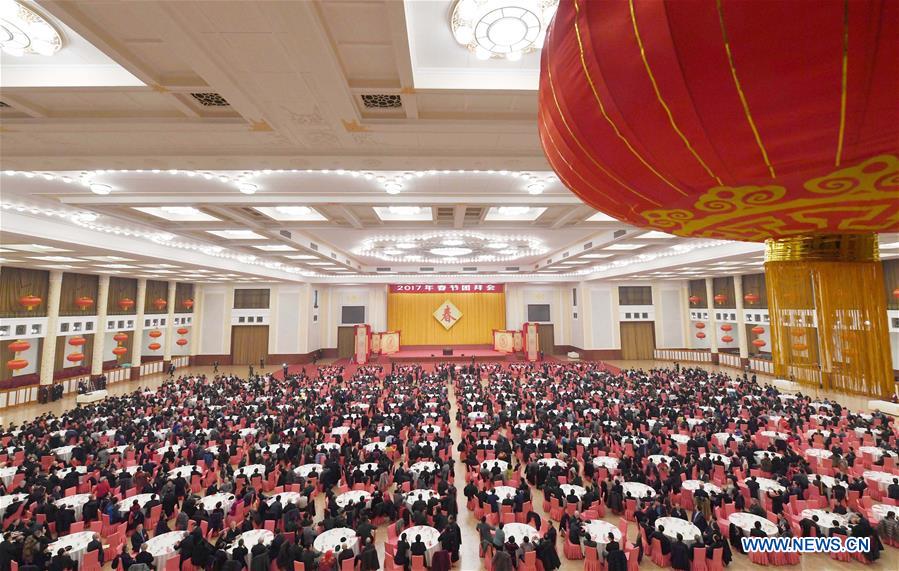A report released on Wednesday shows that the number of Chinese think tanks has grown rapidly in the world during the past year.
![Wang Huiyao, president of CCG, delivers a speech at the release of 2016 Global Go To Think Tank Index Report in Beijing, on Jan 25, 2016. [Photo provided to chinadaily.com.cn] Wang Huiyao, president of CCG, delivers a speech at the release of 2016 Global Go To Think Tank Index Report in Beijing, on Jan 25, 2016. [Photo provided to chinadaily.com.cn]](http://images.china.cn/attachement/jpg/site1007/20170126/f44d307d90cc19f3d9a004.jpg) |
|
Wang Huiyao, president of CCG, delivers a speech at the release of 2016 Global Go To Think Tank Index Report in Beijing, on Jan 25, 2016. [Photo provided to chinadaily.com.cn]
|
Nine Chinese think tanks were included among the world’s top think tanks in the 2016 Global Go To Think Tank Index Report, published by the think tank and civil societies program at the Lauder Institute of University of Pennsylvania (TTCSP).
Selected from a list of 175 top think tanks in the world, these nine think tanks are China Institutes of Contemporary International Relations; Chinese Academy of Social Sciences; China Institute of International Studies; Development Research Center of the State Council; Shanghai Institute for International Studies; Institute of International and Strategic Studies Peking University; Unirule Institute of Economics; Center for China and Globalization; and Chongyang Institute for Financial Studies, with China Institute of Contemporary International Relations ranking the highest at 33.
The report shows the United States at the top with the largest number of think tanks, at 1,835, while China holds the second place with 435, followed by UK, 288, and India, 280.
The 2016 study was subdivided into 52 lists based on such categories as region, area of research and special achievement, in which 41 Chinese think tanks were selected with 18 of them also outstanding in the Top Think Tanks in China, India, Japan and the Republic of Korea.
“It’s very meaningful that a number of Chinese think tanks are influencing the world,” said Wang Huiyao, president of the Center for China and Globalization. “More think tanks are needed to help our government in making decisions accurately and scientifically. Meanwhile, think tanks serve more like a ‘soft power’, which can also help enhance our country’s international stature,” he said.
According to the report, three Chinese thinks tanks have made their mark Think Tanks to Watch. They are Shanghai Advanced Institute of Finance, Unirule Institute of Economics, and Center for China and Globalization.
Another four are among the Best New Think Tanks, including Alibaba think tank, 21st Silk Road Collaborative Center, Qianhai Institute for Innovative Research, and Center for Eco-Financial Studies, with Alibaba think tank ranking the highest at 23.
Referred to as “think tanks’ think tank”, TTCSP manages and supports a global network of close to 7,000 think tanks and trains future think tank scholars and executives.
“Since 2006, our ranking process has been refined and streamlined, and the number and scope of the institutions and individuals involved has steadily grown.” said James McGann, director of the TTCSP.
The 2016 report shows continued expansion of think tanks in Asia, Latin America, Africa, the Middle East, and North Africa.
Besides, there is increasing diversity among think tanks in these regions with independent, political party affiliated, and corporate and business sector think tanks that are being created with greater frequency.

![Wang Huiyao, president of CCG, delivers a speech at the release of 2016 Global Go To Think Tank Index Report in Beijing, on Jan 25, 2016. [Photo provided to chinadaily.com.cn] Wang Huiyao, president of CCG, delivers a speech at the release of 2016 Global Go To Think Tank Index Report in Beijing, on Jan 25, 2016. [Photo provided to chinadaily.com.cn]](http://images.china.cn/attachement/jpg/site1007/20170126/f44d307d90cc19f3d9a004.jpg)